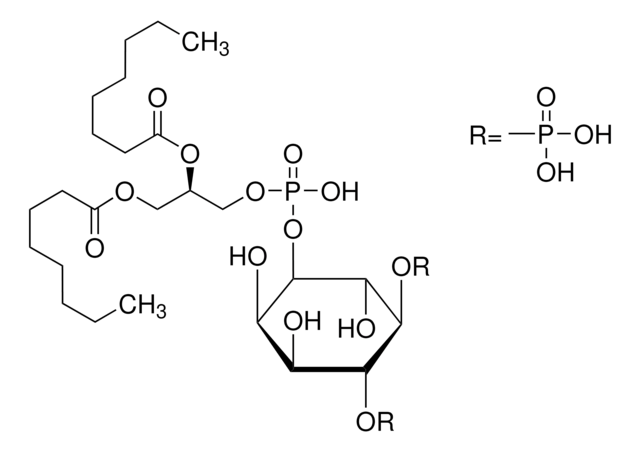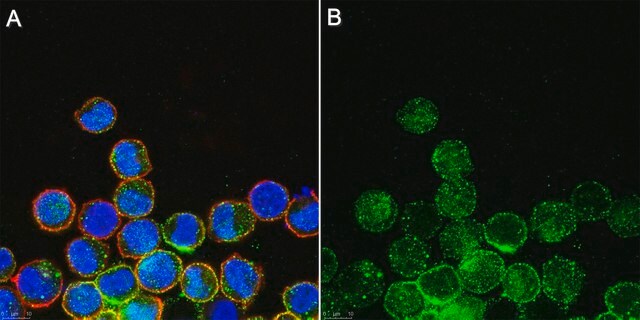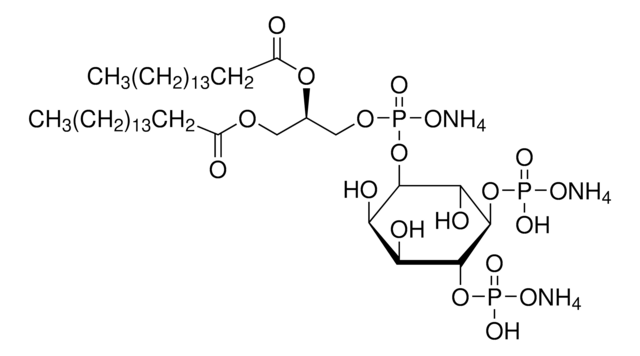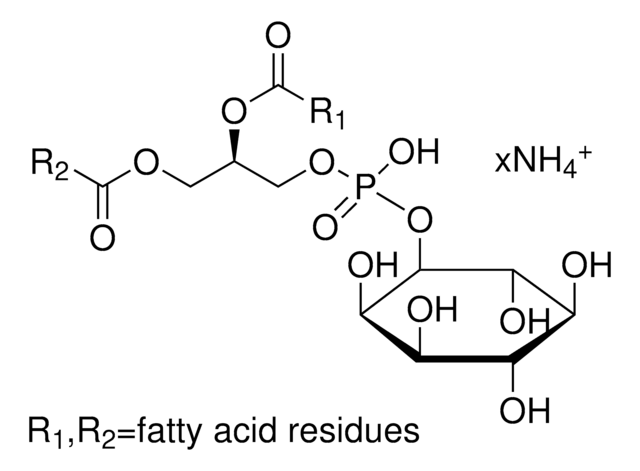524644
L-α-Phosphatidyl-D-myo-inositol-4,5-bisphosphate, Triammonium Salt, Porcine Brain
A component of membrane-bound receptors in association with phospholipase C (PLC).
Synonym(e):
L-α-Phosphatidyl-D-myo-inositol-4,5-bisphosphate, Triammonium Salt, Porcine Brain, PIP₂
About This Item
Empfohlene Produkte
Qualitätsniveau
Assay
≥98% (TLC)
Form
solid
Hersteller/Markenname
Calbiochem®
Lagerbedingungen
OK to freeze
desiccated (hygroscopic)
protect from light
Farbe
white to off-white
Löslichkeit
water: 10 mg/mL
chloroform: 50 mg/mL
Versandbedingung
wet ice
Lagertemp.
−70°C
InChI
1S/C47H85O19P3.3H3N/c1-3-5-7-9-11-13-15-17-19-20-22-24-26-28-30-32-34-36-41(49)63-39(37-61-40(48)35-33-31-29-27-25-23-21-18-16-14-12-10-8-6-4-2)38-62-69(59,60)66-45-42(50)43(51)46(64-67(53,54)55)47(44(45)52)65-68(56,57)58;;;/h11,13,17,19,22,24,28,30,39,42-47,50-52H,3-10,12,14-16,18,20-21,23,25-27,29,31-38H2,1-2H3,(H,59,60)(H2,53,54,55)(H2,56,57,58);3*1H3/b13-11-,19-17-,24-22-,30-28-;;;/t39-,42?,43+,44?,45-,46?,47?;;;/m1.../s1
InChIKey
GAIOWTITBYPFJE-JVILRMJCSA-N
Allgemeine Beschreibung
Note: This product is not to be used for animal treatment, in vivo research or in any other contact procedure with livestock.
Biochem./physiol. Wirkung
Brain phospholipase D (PLD)
Verpackung
Warnhinweis
Rekonstituierung
Sonstige Hinweise
Shyng, S.-L., and Nichols, C.G. 1998. Science 282, 1138.
Mazzotti, G., et al. 1995. J. Histochem. Cytochem. 43, 181.
Liscovitch, M., et al. 1994. J. Biol. Chem. 269, 21403.
Chauhan, A., et al. 1991. Biochem. Biophys. Res. Commun. 175, 852.
Williamson, J.R. 1986. Hypertension 8, 140.
Berridge, M.J., and Irvine, R.F. 1984. Nature312, 315.
Rechtliche Hinweise
Lagerklassenschlüssel
11 - Combustible Solids
WGK
WGK 3
Flammpunkt (°F)
Not applicable
Flammpunkt (°C)
Not applicable
Analysenzertifikate (COA)
Suchen Sie nach Analysenzertifikate (COA), indem Sie die Lot-/Chargennummer des Produkts eingeben. Lot- und Chargennummern sind auf dem Produktetikett hinter den Wörtern ‘Lot’ oder ‘Batch’ (Lot oder Charge) zu finden.
Besitzen Sie dieses Produkt bereits?
In der Dokumentenbibliothek finden Sie die Dokumentation zu den Produkten, die Sie kürzlich erworben haben.
Unser Team von Wissenschaftlern verfügt über Erfahrung in allen Forschungsbereichen einschließlich Life Science, Materialwissenschaften, chemischer Synthese, Chromatographie, Analytik und vielen mehr..
Setzen Sie sich mit dem technischen Dienst in Verbindung.








